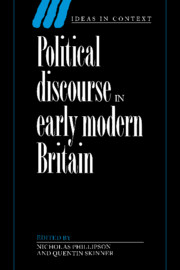Book contents
- Frontmatter
- Contents
- Contributors
- Preface
- PART I
- 1 George Buchanan and the anti-monarchomachs
- 2 The ancient constitution revisited
- 3 Arminianism: the controversy that never was
- 4 ‘Scientia civilis’ in classical rhetoric and in the early Hobbes
- PART II
- PART III
- PART IV
- PART V
- A bibliography of the writings of J. G. A. POCOCK
- Index
- Ideas in Context
1 - George Buchanan and the anti-monarchomachs
Published online by Cambridge University Press: 07 May 2010
- Frontmatter
- Contents
- Contributors
- Preface
- PART I
- 1 George Buchanan and the anti-monarchomachs
- 2 The ancient constitution revisited
- 3 Arminianism: the controversy that never was
- 4 ‘Scientia civilis’ in classical rhetoric and in the early Hobbes
- PART II
- PART III
- PART IV
- PART V
- A bibliography of the writings of J. G. A. POCOCK
- Index
- Ideas in Context
Summary
In the opening chapter of The Machiavellian Moment John Pocock explores the themes of ‘Experience, Usage and Prudence’. The analysis is characteristically wide-ranging; but it may fairly be said to find its focus in Sir John Fortescue's account of English law and the implications of that account for the exercise of prudence in positive legislation. At a much later stage in the book ‘percipient North Britons’ are recognised as significant contributors to the ‘Atlantic republican tradition’ which developed in an ‘Anglophone civilisation’. In particular, Andrew Fletcher of Saltoun is presented as one of those Scots ‘who understood the language of English controversy better, in some respects, than the English themselves’. But Fletcher and those who followed his lead were formed also, it can be argued, by a specifically Scottish tradition of discourse which reflected a political experience differing from that of England and a vein of controversy in which, for one thing, the jurisprudence of the civil law had an especially important part. A major episode in the development of that tradition – and, more generally, in the early modern European debate on political authority – was the controversy precipitated by George Buchanan's dialogue De jure regni apud Scotos.
The political ideas Buchanan brought to bear in his defence of the deposition of Mary Queen of Scots were those of a humanist influenced above all by Ciceronian Stoicism. The vigorous polemical interchanges provoked by that defence belong of course to the argument over post-Reformation ‘resistance theory’; but the debate was not conducted primarily in the theological and scriptural terms characteristic of so much of that controversy.
- Type
- Chapter
- Information
- Political Discourse in Early Modern Britain , pp. 3 - 22Publisher: Cambridge University PressPrint publication year: 1993
- 4
- Cited by



